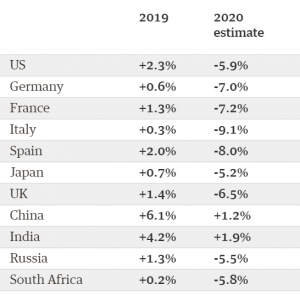COVID-19 and Global Economic Forecasts - Article by Sunny Singh
We are living in unprecedented times (in the modern age), brought about by the COVID-19 healthcare crisis. Few would have expected the global impact when the new decade began four short months ago, even if that now feels like a lifetime away due to the saturated 24/7 media coverage of the crisis!
Since the pandemic went global it has not been ‘business as usual’ and most business continuity plans by and large went out of the window. Companies have had to adapt quickly to the new ‘normal’ imposed by national lockdowns with drastic changes to the way we work and communicate. Output has been reduced due to scaled back operations, though perversely in some organisations, individual productivity could potentially be up as working employees take on extra responsibilities for furloughed staff and fulfil that often quoted phrase of ‘doing more with less’.
The effect on the global economy has been far reaching, with few predicting the global downturn even when media stories were emerging at the end of 2019 on the rapid spread of COVID-19 in China. At the start of the year, the International Monterey Fund forecasted 3.3% annual growth for 2020 in the global economy. This has been recently revised down by the IMF to a 3% contraction in the global economy for 2020. This level of contraction would rival the ‘Great Depression’ of the 1930s that led to widespread mass unemployment in the US and UK. For a modern-day comparison, the financial system crisis in late 2008 shrank global activity by 0.1% in 2009. Worryingly, McKinsey in collaboration with Oxford Economics has modelled different scenarios that go further than IMF predictions and show a global economic contraction of between 8% and 13%, with most countries taking up to two years to recover to pre-virus levels of Gross Domestic Product.
IMF prediction on changes in GDP of leading economies

Fiscal and monetary stimulus packages like those unveiled by the UK and US, are being utilised by governments globally to help mitigate the economic fallout and prevent job losses. They will have to be paid back one way or another as they are in effect large scale unplanned loans. That said, they are the correct measure to take, as they have brought clarity to the business world and provided much needed breathing room to put vital healthcare measures around social distancing into action.
Whilst the current situation can seem overwhelming, it’s important to remember that you are not alone. The International Labour Organisation has estimated that full/partial lockdown measures are now affecting 2.7 billion workers globally, representing around 81% of the world’s workforce. Practically, the entire global population to some degree or another (through this crisis) will experience some form of anxiety and feelings of being overwhelmed. It’s vital to keep things in context, in that we are connected in this struggle together, but we will get past this crisis as nothing lasts forever. Support each other by listening and showing empathy to anybody who is struggling, be that friends, family, colleagues, neighbours or even strangers!
Once past this current crisis, the question remains on what type of world should we build in the aftermath for future generations to inherit?

Sunny Singh – Stafforce Sales Director
Sunny Singh is a recruitment Sales Director, with experience of the industry dating back to 2000. Fully versed in the creation of outsourced contingent workforce solutions incorporating remote, project based, branch, embedded onsite, RPO and hybrid delivery models. Takes a consultative approach with companies of all sizes throughout the UK and Europe, aimed at building long term client relationships that continue to grow, evolve and add value. Sector specialisms include:
Retail & E-Commerce Logistics
Food & Drink Manufacturing
Fresh Produce & Agriculture
Manufacturing & Automotive




